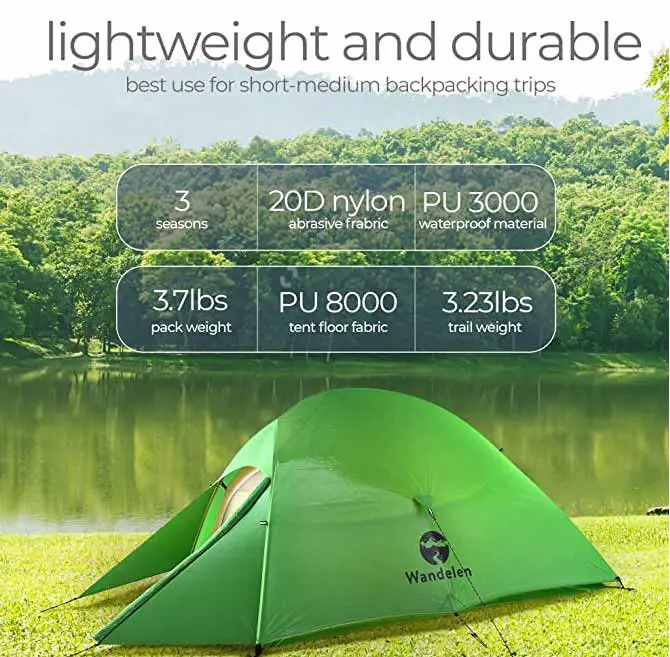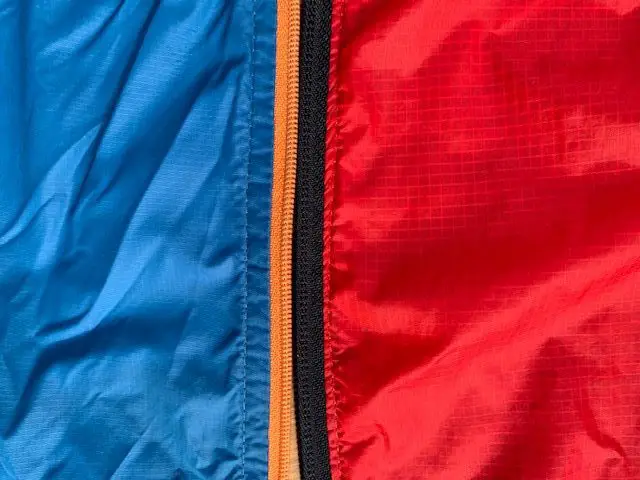Introduction to 20d Nylon
Nylon is a synthetic fabric made from petroleum products, and it has been a popular material in the outdoor industry for decades.
One of the most common types of nylon used in outdoor gear is 20d nylon, which offers a good balance of weight, durability, and weather resistance.
This blog post will take a closer look at what 20d nylon is, its properties, and how it is used in various outdoor gear.
What Does 20D Mean?
The “d” in 20d nylon stands for denier, a unit of measurement for the linear mass density of fibers. In simple terms, denier refers to the thickness of the individual fibers that make up a fabric. A higher denier number indicates thicker fibers, while a lower denier number means thinner fibers.
20D nylon is made from fibers that are 20 denier in thickness, making it a lightweight and relatively thin fabric.
However, despite its low denier, it still offers good strength and durability for outdoor applications.
Properties of 20d Nylon
20d nylon has several properties that make it suitable for use in outdoor gear. Some of these properties include:
- Lightweight: Due to its low denier, 20d nylon is a lightweight fabric, making it ideal for gear that needs to be carried long distances or packed down small.
- Durable: Despite its light weight, 20d nylon is surprisingly strong and can withstand a fair amount of wear and tear. Its durability comes from its high tensile strength and resistance to abrasion.
- Water-resistant: Nylon fibers are naturally water-resistant, and 20d nylon is often treated with a durable water repellent (DWR) coating to enhance its water resistance. This makes it suitable for use in wet environments or gear that needs to keep its contents dry.
- Quick-drying: Another useful property of 20d nylon is its ability to dry quickly. This is particularly important for outdoor gear that may be exposed to moisture, as it helps to reduce the risk of mold and mildew growth.
- Packable: Due to its thin fibers and lightweight nature, 20d nylon can be easily compressed and packed down small. This makes it a popular choice for gear that needs to be stored compactly when not in use.
20d Nylon in Outdoor Gear
Now that we understand the properties of 20d nylon, let’s explore how it is used in various outdoor gear.
Tents
20d nylon is a popular material for lightweight backpacking tents, as it offers a good balance of weight, durability, and weather resistance.

It is often used for the tent’s canopy and rainfly, providing protection from wind, rain, and insects.
Some ultralight tents may use even thinner fabrics, such as 10d or 15d nylon, but these may sacrifice some durability for the sake of weight savings.
Sleeping Bags
Sleeping bags can also benefit from the use of 20d nylon, particularly in their shell materials. A lightweight and durable shell helps to protect the insulation inside the sleeping bag, keeping it dry and maintaining its warmth.
Some sleeping bags may use a combination of 20d nylon and other fabrics, such as ripstop nylon or polyester, to balance weight, durability, and cost.
Backpacks
While 20d nylon may not be the primary material used in backpacks, it can be found in lightweight and packable daypacks or as a reinforcement in high-wear areas. These backpacks are designed to be lightweight and easily stowed away when not in use but still provide enough durability for everyday use.
Jackets
Outdoor jackets, such as rain jackets or windbreakers, often use 20d nylon as a shell material. Its lightweight nature and water resistance make it ideal for protecting the wearer from the elements. Additionally, 20d nylon’s packability allows these jackets to be compressed and stored in a small pouch when not in use, making them convenient for travel or backpacking trips.
Hammocks
20d nylon is also a popular fabric for lightweight hammocks, as its strength and durability can support the weight of a person while still being lightweight and packable. These hammocks are often used by backpackers and campers as an alternative to traditional tents, providing a comfortable and portable sleeping solution.
Caring for 20d Nylon Gear
Proper care and maintenance of your 20d nylon gear are essential for ensuring its longevity and performance. Some tips for caring for 20d nylon include:
-Cleaning: Regularly clean your 20d nylon gear with mild soap and water, and avoid using harsh chemicals or abrasives that could damage the fabric. Always follow the manufacturer’s care instructions for your specific gear.
-DWR Maintenance: Over time, the DWR coating on your 20d nylon gear may wear off, reducing its water resistance. To maintain its performance, reapply a DWR treatment according to the manufacturer’s instructions.
-Storage: When not in use, store your 20d nylon gear in a cool, dry place away from direct sunlight to prevent fading and degradation of the fabric.
-Repairs: If your 20d nylon gear becomes damaged, repair it as soon as possible to prevent further damage. Small tears or holes can be patched with a nylon repair tape or sewn using a strong nylon thread.
Conclusion
In conclusion, 20d nylon is a lightweight, durable fabric that is widely used in outdoor gear due to its strength, water resistance, and packability.Some key facts about 20d nylon include:
1. 20d nylon is a synthetic fabric made from petroleum products.
2. The “d” in 20d nylon stands for denier, a measure of fiber thickness.
3. 20d nylon is lightweight and relatively thin.
4. Despite its low denier, 20d nylon offers good strength and durability.
5. Nylon fibers are naturally water-resistant, and 20d nylon is often treated with a DWR coating for added protection.
6. 20d nylon is quick-drying and packable.
7. Common outdoor gear applications include tents, sleeping bags, backpacks, jackets, and hammocks.
8. Proper care and maintenance are essential for the longevity and performance of 20d nylon gear.
9. Caring for 20d nylon gear involves regular cleaning, DWR maintenance, proper storage, and timely repairs.
Whether you’re a seasoned adventurer or just getting started in the world of outdoor exploration, chances are you’ll encounter 20d nylon gear at some point in your journey. Its versatility and performance make it a popular choice for a wide range of outdoor applications.
FAQs
Is 20D nylon waterproof?
20D nylon is not inherently waterproof, but it can be treated with a waterproof coating or have a waterproof membrane laminated to it to make it water-resistant. However, its water resistance may decrease over time due to wear and tear.
How waterproof is 20D?
20D (denier) is a unit of measurement referring to the thickness and density of fabric fibers, not a direct measure of waterproofness. However, 20D fabrics are typically lightweight and thin, which means they may have some level of water resistance but are not entirely waterproof. To determine the waterproofness of a 20D fabric, you should consider additional factors such as the type of material, coatings, or treatments applied to the fabric.
What does 20D nylon mean?
20D nylon refers to a lightweight, durable synthetic fabric made from 20 denier nylon fibers. The term “denier” is a unit of measurement that indicates the linear mass density of fibers, with a higher number representing thicker fibers. In this case, 20D nylon has relatively thin fibers, resulting in a lightweight, yet strong and abrasion-resistant material commonly used in outdoor gear, such as tents, backpacks, and jackets.
Which is better 210T vs 20D?
It is difficult to determine which is better between 210T and 20D without considering the specific context and application, as both materials have their advantages and disadvantages.
210T refers to a type of polyester fabric, where ‘T’ stands for ‘thread count’ per square inch. It is known for its durability, water resistance, and affordability. It is commonly used for tents, backpacks, and outdoor gear.
20D, on the other hand, refers to a nylon fabric, where ‘D’ stands for ‘denier’, which is a measure of fiber thickness. 20D nylon is lightweight, breathable, and offers good tear resistance. It is often used for lightweight outdoor gear, like jackets and sleeping bag liners.
In summary, if you prioritize durability and water resistance, 210T polyester might be the better choice. However, if you’re looking for a lightweight and breathable material, 20D nylon would be more suitable.
Is 20 denier strong?
denier is not considered very strong, as it refers to the thickness and durability of fabric, specifically hosiery. The lower the denier number, the thinner and more delicate the fabric. While 20 denier is more sheer and lightweight, it is also more prone to runs and tears compared to higher denier fabrics, which offer more durability and strength.





